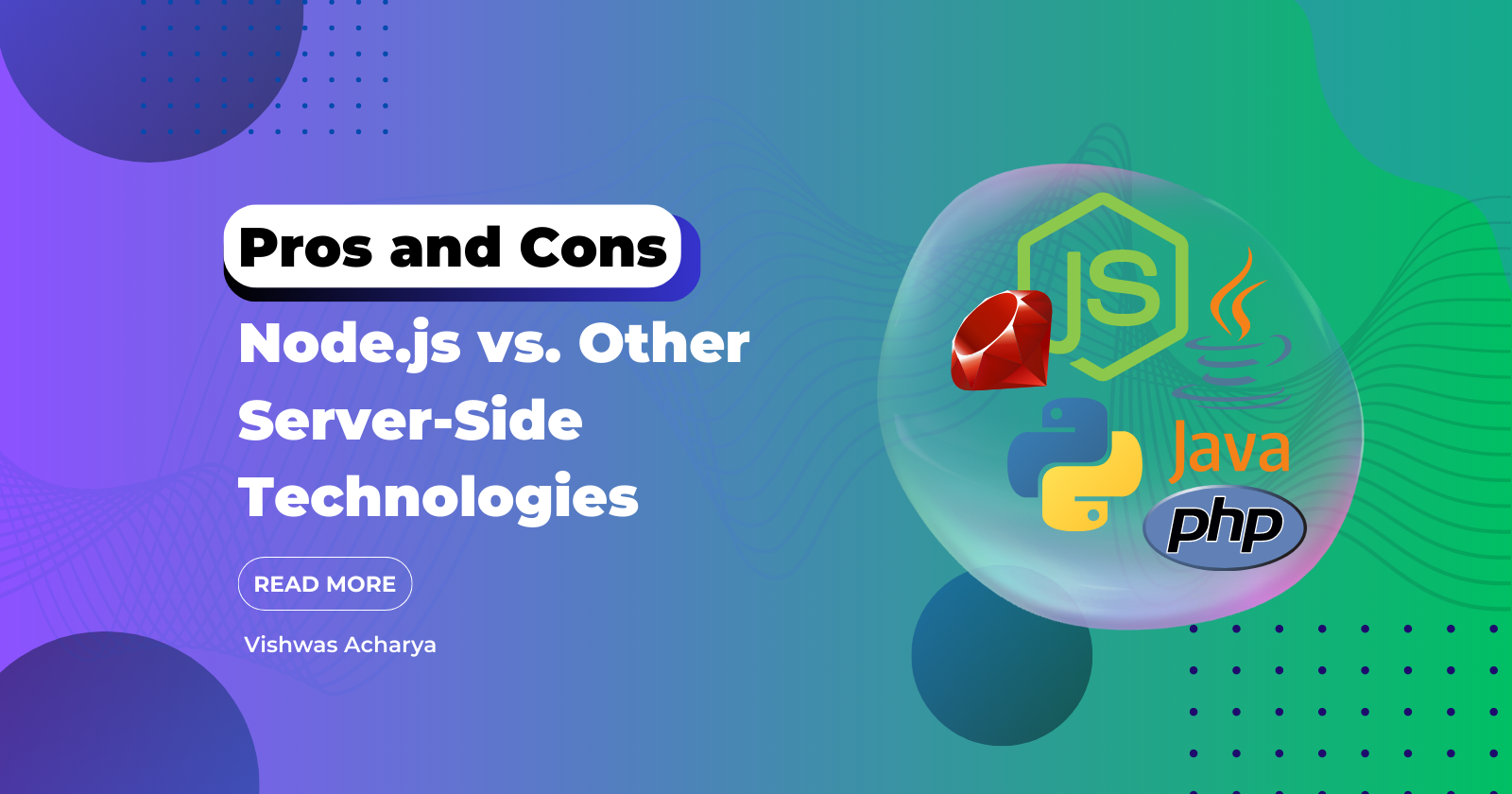Node.js vs. Other Server-Side Technologies: Pros and Cons
 Vishwas Acharya
Vishwas Acharya
Introduction
In the world of web development, choosing the right server-side technology is crucial for building robust and scalable applications. Node.js has gained significant popularity over the years due to its unique features and capabilities. However, it's essential to understand how Node.js compares to other server-side technologies and explore their respective pros and cons. In this article, we will delve into Node.js, along with its advantages and disadvantages when compared to other popular server-side technologies.
What is Node.js?
Node.js is an open-source, JavaScript-based runtime environment built on Chrome's V8 JavaScript engine. It allows developers to execute JavaScript code on the server side, enabling the development of high-performance, event-driven applications. Node.js utilizes a single-threaded, non-blocking I/O model, making it efficient for handling a large number of concurrent requests.
The Pros of Node.js
Lightweight and Fast
One of the significant advantages of Node.js is its lightweight and fast nature. It has a minimalistic runtime and doesn't require a heavyweight server like traditional technologies such as Java or .NET. Node.js applications are known for their excellent performance and low memory consumption.
Non-Blocking and Event-Driven
Node.js follows an event-driven architecture, making it highly efficient in handling concurrent requests. It utilizes non-blocking I/O operations, allowing multiple requests to be processed simultaneously without blocking the execution of other tasks. This approach enhances the scalability and responsiveness of Node.js applications.
Vast Ecosystem and Package Manager
Node.js has a vibrant and extensive ecosystem with a wide range of modules and libraries available through the Node Package Manager (NPM). Developers can easily leverage these packages to add functionalities to their applications, saving time and effort. The NPM registry hosts thousands of open-source modules, making Node.js a highly productive environment for developers.
Scalability and Real-Time Applications
Node.js excels in building scalable, real-time applications. Its event-driven nature and non-blocking I/O allow developers to handle a massive number of concurrent connections efficiently. This makes it an ideal choice for applications that require real-time communication, such as chat applications, collaborative tools, or IoT (Internet of Things) systems.
The Cons of Node.js
Callback Hell
One common challenge faced by Node.js developers is the potential for callback hell. Asynchronous programming in Node.js heavily relies on callbacks, which can lead to deeply nested and complex code structures. This can make code maintenance and readability more challenging, especially for larger projects. However, modern JavaScript features and frameworks like Promises and async/await have alleviated this issue to a great extent.
Single-Threaded Nature
Node.js operates on a single thread, which means it doesn't take full advantage of multi-core processors by default. CPU-bound tasks can potentially block the event loop, affecting the responsiveness of the application. However, Node.js compensates for this limitation by utilizing asynchronous I/O operations, enabling it to handle a significant number of concurrent connections efficiently.
Not Suitable for CPU-Intensive Tasks
Due to its single-threaded nature, Node.js may not be the best choice for CPU-intensive tasks. Applications that heavily rely on intensive calculations or data processing might experience performance issues when using Node.js. In such cases, technologies like Java or Python, which leverage multiple threads or processes, may be more suitable.
Lack of Mature Libraries and Frameworks
Although the Node.js ecosystem is vast, some domains may still lack mature libraries and frameworks compared to other technologies. This can make it more challenging to find ready-made solutions or require developers to build custom functionalities. However, the community is continually evolving, and many popular frameworks like Express.js or Nest.js have gained considerable maturity over time.
Node.js vs. PHP
Performance and Scalability
Node.js and PHP exhibit different performance characteristics. Node.js, with its event-driven architecture, handles concurrent requests efficiently, making it suitable for applications requiring high scalability and real-time updates. PHP, on the other hand, is known for its ease of use and simplicity, making it an excellent choice for small to medium-sized applications.
Developer Productivity
Node.js and PHP offer different development experiences. Node.js, being JavaScript-based, allows full-stack JavaScript development, enabling developers to reuse code between the front-end and back-end. PHP has a large community and mature frameworks like Laravel, offering extensive built-in features and rapid development capabilities.
Community and Ecosystem
Node.js and PHP both have active communities and vibrant ecosystems. Node.js benefits from its NPM package manager, which hosts a wide range of open-source modules. PHP has its package manager, Composer, along with a rich collection of libraries and frameworks. The choice between the two technologies depends on the specific needs of the project and the availability of required modules.
Use Cases
Node.js is well-suited for real-time applications, microservices, APIs, and high-concurrency systems. It shines in scenarios that require real-time communication or event-driven functionality. PHP is often used for web applications, content management systems (CMS), and server-side rendering. The selection between Node.js and PHP depends on the project requirements, performance considerations, and developer preferences.
Node.js vs. Python
Performance and Concurrency
Node.js and Python differ in terms of performance and concurrency. Node.js, with its event-driven, non-blocking I/O model, performs exceptionally well in handling concurrent requests. Python, on the other hand, offers multi-threading and multiprocessing capabilities, making it suitable for CPU-intensive tasks and parallel processing.
Language Syntax and Flexibility
Node.js, being JavaScript-based, has a concise and expressive syntax, making it easy to read and write. JavaScript's versatility enables developers to build both frontend and backend applications using a unified language. Python is known for its clean and readable syntax, emphasizing code readability and maintainability.
Community Support and Libraries
Node.js has a large and active community that contributes to its vast collection of libraries and frameworks. JavaScript's popularity ensures that developers have a wide range of resources and support available. Python also has a strong community and a rich ecosystem with numerous libraries and frameworks, such as Django and Flask, which simplify web development.
Application Domains
Node.js is commonly used for web applications, real-time chat systems, streaming applications, and IoT platforms. Its event-driven architecture makes it a good fit for scenarios that require high concurrency and real-time updates. Python finds its applications in data analysis, machine learning, scientific computing, and scripting tasks. Its extensive libraries like NumPy and TensorFlow make it a preferred choice for data-related projects.
Node.js vs. Ruby on Rails
Performance and Scalability
Node.js and Ruby on Rails differ in terms of performance and scalability. Node.js, with its non-blocking I/O and event-driven model, excels in handling concurrent connections and real-time applications. Ruby on Rails, while known for its developer-friendly nature, may not provide the same level of performance and scalability as Node.js for highly concurrent or real-time scenarios.
Developer Experience
Both Node.js and Ruby on Rails offer a pleasant developer experience. Node.js, with its JavaScript-based ecosystem, allows developers to work with a unified language across the entire stack. Ruby on Rails emphasizes convention over configuration, enabling rapid development with its opinionated framework structure.
Code Maintainability and Readability
Node.js and Ruby on Rails have different approaches to code maintainability and readability. Node.js, being JavaScript-based, benefits from its wide adoption and consistent coding practices. Ruby on Rails, with its emphasis on convention and readability, encourages developers to write clean and expressive code. The choice between the two depends on the development team's preferences and familiarity with the languages.
Database Integration and ORM
Both Node.js and Ruby on Rails offer robust database integration options. Node.js has libraries like Sequelize and MongoDB that provide flexible and efficient database access. Ruby on Rails, with its built-in ORM (Object-Relational Mapping) tool, ActiveRecord, simplifies database interactions and promotes database-agnostic development.
Node.js vs. Java
Performance and Concurrency
Node.js and Java exhibit different performance characteristics. Node.js, with its non-blocking I/O model, excels in handling concurrent requests and performs well in scenarios requiring high scalability. Java, with its multi-threading capabilities, allows for the efficient utilization of multi-core processors and is well-suited for CPU-intensive tasks.
Language and Framework Maturity
Node.js and Java have different levels of language and framework maturity. Node.js, being based on JavaScript, benefits from its extensive ecosystem and continuous development. Java, with its long-standing presence and robust frameworks like Spring, offers a mature and stable environment for enterprise-level applications.
Community and Industry Adoption
Both Node.js and Java have strong communities and widespread industry adoption. Node.js has gained significant popularity due to its scalability, real-time capabilities, and ease of JavaScript development. Java, with its long history and established enterprise support, remains a top choice for large-scale, mission-critical systems.
Enterprise Application Development
Node.js and Java have different strengths when it comes to enterprise application development. Node.js is well-suited for microservices, APIs, and real-time applications, while Java is often preferred for complex, large-scale systems that require strict security, reliability, and performance.
Conclusion
Node.js offers several advantages as a server-side technology, such as its lightweight nature, non-blocking I/O, extensive ecosystem, and real-time application capabilities. However, it's important to consider the limitations and potential challenges associated with
Node.js, including callback hell, single-threaded nature, suitability for CPU-intensive tasks, and the maturity of libraries and frameworks. Comparing Node.js to other server-side technologies like PHP, Python, Ruby on Rails, and Java helps us understand their respective strengths and weaknesses in different application domains. Ultimately, the choice of server-side technology depends on the specific requirements of the project, the scalability needs, the developer's familiarity with the language, and the available ecosystem and community support.
FAQs (Frequently Asked Questions)
Q: What is the main advantage of Node.js?
A: Node.js offers excellent scalability, real-time capabilities, and a vast ecosystem of libraries and frameworks.
Q: Is Node.js suitable for CPU-intensive tasks?
A: Node.js is not the best choice for CPU-intensive tasks due to its single-threaded nature. Technologies like Java or Python are more suitable for such tasks.
Q: Can I use Node.js with a traditional relational database?
A: Yes, Node.js can be used with traditional relational databases like MySQL or PostgreSQL, as well as NoSQL databases like MongoDB.
Q: Which server-side technology is best for enterprise applications?
A: Java is often preferred for enterprise applications due to its mature frameworks, robustness, and industry support.
Q: Is Node.js more popular than PHP?
A: Both Node.js and PHP have significant popularity and widespread usage. The choice between the two depends on the specific requirements of the project and the developer's preferences.
By Vishwas Acharya 😉
Checkout my other content as well:
YouTube:
Podcast:
Book Recommendations:
Subscribe to my newsletter
Read articles from Vishwas Acharya directly inside your inbox. Subscribe to the newsletter, and don't miss out.
Written by

Vishwas Acharya
Vishwas Acharya
Embark on a journey to turn dreams into digital reality with me, your trusted Full Stack Developer extraordinaire. With a passion for crafting innovative solutions, I specialize in transforming concepts into tangible, high-performing products that leave a lasting impact. Armed with a formidable arsenal of skills including JavaScript, React.js, Node.js, and more, I'm adept at breathing life into your visions. Whether it's designing sleek websites for businesses or engineering cutting-edge tech products, I bring a blend of creativity and technical prowess to every project. I thrive on overseeing every facet of development, ensuring excellence from inception to execution. My commitment to meticulous attention to detail leaves no room for mediocrity, guaranteeing scalable, performant, and intuitive outcomes every time. Let's collaborate and unleash the power of technology to create something truly extraordinary. Your dream, my expertise—let's make magic happen! Connect with me on LinkedIn/Twitter or explore my work on GitHub.